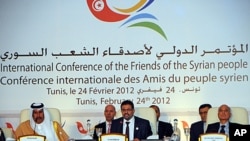A group of Western and Arab-led nations began a meeting Friday in Tunisia in a renewed effort to curb the violence in Syria that has left thousands dead in the last year.
Representatives of more than 70 nations and international organizations, including U.S. Secretary of State Hillary Clinton, gathered in the capital Tunis to demand that Syrian authorities pledge to immediately end all violence and allow the delivery of foreign humanitarian aid to hard-hit areas within days.
In a draft declaration to be presented at the "Friends of Syria" meeting, diplomats are expected to call on Syrian President Bashar al-Assad to order an immediate stop to his crackdown on an 11-month uprising, so that the aid can be delivered within 48 hours.
Syrian National Council Executive Director Haithem al-Maleh expressed confidence that the conference will help move the Syrian revolution forward.
"They will give us the power as a national council, a political umbrella for the revolution inside Syria and I think they will push the international community to take good steps against the Syrian regime," said al-Maleh.
Meanwhile, Syrian government forces are continuing their bombardment on the opposition-held neighborhood of Baba Amr in the central city of Homs. Activists say at least four people were killed Friday in the shelling.
Homs residents say food, water and medical supplies are running dangerously low after almost three weeks of relentless attacks surrounding the opposition protest hub.
Displaced Syrians living along the Lebanon-Syria border are looking to the "Friends of Syria" to help improve the humanitarian situation in their country. Rana Haju hopes the meeting will help her return home to Homs.
"We are calling on them to impose sanctions on Assad regime, and he should step down, enough oppression, we got displaced, I've been seven months here and I don't know anything about my family, I hope that we can return back to our country," said Haju.
The "Friends of Syria" group says it is committed to enforcing unspecified sanctions, which could include travel bans, asset freezes, and a halt to Syrian oil purchases.
Russia and China have said they will not attend the Tunis meeting. Both powers have repeatedly blocked the U.N. Security Council from taking action against the Syrian government, saying the Council should not take sides in a domestic conflict.
Rebels of the Free Syrian Army have been urging the international community to arm them, but Western and Arab nations have been reluctant to agree, fearing foreign military intervention could make the situation worse.
| Join the conversation on our social journalism site - Middle East Voices. Follow our Middle East reports on Twitter and discuss them on our Facebook page. |




